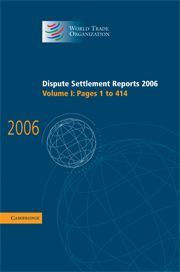Mexico – Tax Measures on Soft Drinks and Other Beverages (WT/DS308): Report of the Appellate Body
Published online by Cambridge University Press: 13 December 2017
Summary
INTRODUCTION
Mexico appeals certain issues of law and legal interpretations developed in the Panel Report, Mexico – Tax Measures on Soft Drinks and Other Beverages (the “Panel Report”). The Panel was established to consider a complaint by the United States concerning certain tax measures and bookkeeping requirements imposed by Mexico on soft drinks and other beverages that use sweeteners other than cane sugar.
The measures challenged by the United States include: (i) a 20 per cent tax on the transfer or, as applicable, the importation of soft drinks and other beverages that use any sweetener other than cane sugar (the “soft drink tax”); (ii) a 20 per cent tax on specific services (commission, mediation, agency, representation, brokerage, consignment, and distribution), when such services are provided for the purpose of transferring products such as soft drinks and other beverages that use any sweetener other than cane sugar (the “distribution tax”); and (iii) a number of requirements imposed on taxpayers subject to the soft drink tax and to the distribution tax (the “bookkeeping requirements”). Before the Panel, the United States claimed that these measures are inconsistent with paragraphs 2 and 4 of Article III of the General Agreement on Tariffs and Trade 1994 (the “GATT 1994”).
In its first written submission to the Panel, Mexico requested that the Panel decide, as a preliminary matter, to “decline to exercise its jurisdiction in this case” and that it “recommend to the parties that they submit their respective grievances to an Arbitral Panel, under Chapter Twenty of the NAFTA[], which can address both Mexico's concern with respect to market access for Mexican cane sugar in the United States under the NAFTA and the United States' concern with respect to Mexico's tax measures.” Mexico also stated that, in the event the Panel decided to exercise jurisdiction, the Panel should find that the measures are justified pursuant to Article XX(d) of the GATT 1994.
On 18 January 2005, the Panel issued a preliminary ruling in which it rejected Mexico's request. In doing so, the Panel concluded that, “under the DSU[], it had no discretion to decide whether or not to exercise its jurisdiction in a case properly before it.”
- Type
- Chapter
- Information
- Dispute Settlement Reports 2006 , pp. 3 - 42Publisher: Cambridge University PressPrint publication year: 2008
- 12
- Cited by



